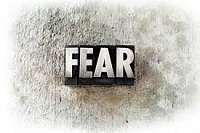
Fear
1. We have been brought up to fear insects. We regard them as unnecessary creatures that do more harm than good. Man continually wages war on them, for they contaminate his food, carry diseases, or devour his crops. They sting or bite without provocation; they fly uninvited into our rooms on summer nights, or beat against our lighted windows. We live in dread not only of unpleasant insects like spiders or wasps but of quite harmless ones like moths. Reading about them increases our understanding without dispelling our fears. Knowing that the industrious and lives in a highly organised society does ‘lathing to prevent us from being filled with revulsion when we find hordes of them crawling over a carefully prepared picnic lunch.
2. No matter how much we like honey. or how much we have read about the uncanny8 sense of direction which bees possess, we have a horror of being stung. Most of our fears are unreasonable, but they are difficult to erase. At the same time, however, insects are strangely fascinating. We enjoy reading about them, especially when we find that, like the praying mantis they lead perfectly horrible lives. We enjoy staring at them, entranced as they go about their business, unaware (we hope) of our presence. Who has not stood awe at the sight of a spider pouncing on a fly, or a column of ants triumphantly bearing home an enormous dead beetle?
3. Last summer, I spent days in the garden watching thousands of ants crawling up the trunk of my prize peach tree. The tree has grown against a warm wall on a sheltered side of the house. I am especially proud of it, not only because it has survived several severe winters, but because it occasionally produces luscious peaches. During the summer I noticed that the leaves of the tree were beginning to wither. Clusters of tiny insects called aphids were to be found on the underside of the leaves. They were visited by a large colony of ants which obtained a sort of honey from them. I immediately embarked on an experiment which, even though it failed to get rid of the ants, kept me fascinated for twenty-four hours. I bound the base of the tree with it impossible for the ants to reach the aphis. The tape was so sticky that sticky tape, making they did not dare to cross it.
4. For a long time, I watched them scurrying around the base of the tree in bewilderment. I even went out at midnight with a torch and noted with satisfaction (and surprise) that the ants were still swarming around the sticky tape without being able to do anything about it. I got up early the next morning hoping to find that the ants had given up in despair. Instead, I saw that they had discovered a new route. They were climbing up the wall of the house and then on to the leaves of the tree. I realized sadly that I have been completely defeated by their ingenuity. The ants had been quick to find an answer to my thoroughly unscientific methods!
Word-Meaning
1.wages —begins and carries on. 2. contaminate—make impure by adding dangerous substance 3 devour — eat hungrily or greedily 4. provocation—making somebody angry by knowingly doing something annoying 5. dispelling—driving away. hatred or horror. 7. hordes—large groups. 8. uncanny—unnatural, beyond what is normal or 6. revulsion—feeling of strong expected, 9. praying mantis—Insect-like a grasshopper, which holds its fronts legs together as if in prayer 10. entranced—great delight as if by magic 11. beetle—a large black insect with hard wings 12. pries—excellent of its kind 13. luscious—inch and sweet in taste or smell 14. clusters—large groups. 15. aphis—very small insect, e.g. greenfly that is filled with harmful to plants. 16. embarked—started.
Questions
1.Answer the following questions as briefly as possible:
a) What is our attitude toward insects?
b) Why does man try to exterminate insects?
c) Why does the writer say that knowing about the insects does not help man to change his attitude toward insects?
d) Do you think that the attitude of man to insects as described herein is right? Why, why not? Give two reasons in support of your thinking.
e) What do you think the writer wants to prove by the experiment he conducted on ants? Quote words/expressions to support your answer.
2. Select words from the above passage which convey a similar meaning to the following :
a) drive away
b) sudden attack
c) cleverness.
Answers
1.a) We look upon them with fear and disgust.
b) Insects contaminate food, carry diseases and devour crops. That is why man tries to exterminate them.
c) The man has an inherent fear of insects due to which he can’t change his attitude toward
d) I don’t agree with what the writer says. We can’t give a uniform judgement on all insects. We can’t say the same about a butterfly and a wasp.
e) The writer wants to prove that ants are cleverer than man. He says, “I had been completely defeated by their ingenuity.”
2. a) dispelling.
b) pouncing.
c) ingenuity.
Download the above Passage in PDF Worksheet (Printable)
More Comprehension Passages:-
Passage No-91. Social Policies (500 Words Subjective Solved)
Passage No-92. Resolutions (550 Words Subjective Solved)
Passage No-93. Block of Flat (500 Words Subjective Solved)
Passage No-94. Travelling (500 Words Subjective Solved)
Passage No-95. Fear (500 Words Subjective Solved)
Passage No-96. Starvation (600 Words Subjective Solved)
Passage No-97. Brave Mountaineer (500 Words Subjective Solved)
Passage No-98. Climbing (450 Words Subjective Solved)
Passage No-99. Role of Business Schools (800 Words Subjective Solved)
Passage No-100. Therapeutic Value (750 Words Subjective Solved)